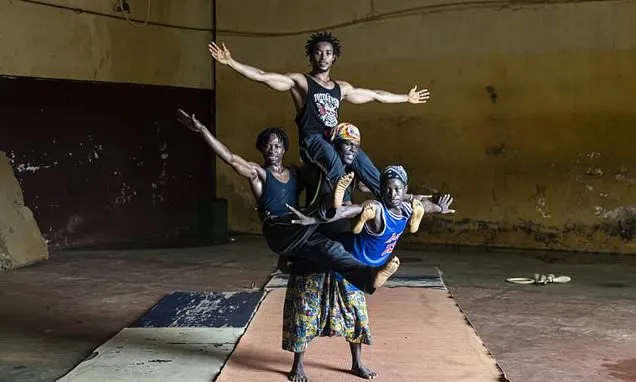In the heat of a warehouse-like building in Conakry, five young men twirl, contort and juggle to the rhythm of percussions, defying the laws of gravity and distorting the anatomy of their bodies.
For several hours each day, they practise at one of west Africa's most renowned circus schools, the Fodeba Keita Acrobatic Arts Centre, which has trained hundreds of disadvantaged youth and showcased students around the world.
Some perform backflips while others work on trapeze tricks, practise precarious balance work or juggle.
Contortionist Mohamed Fofana, whose seemingly impossible distortions make the heart race and the stomach turn, twists his head 180 degrees to face behind him.
The school, which hosts around 100 students, was founded by Ibrahim Bamba, stage name Maitre BBL, a former member of the legendary Circus Baobab.
In the hall, built in 2000 by the French Embassy in Guinea, old and tattered equipment bears the marks of hours of training.
On the day AFP visited, many of the students were on tour in Turkey with the school's troupe, Cirque Tinafan, which means "Tomorrow is Better" in the local Susu language.
International springboard
Despite the school's limited resources it serves as a springboard for many of its young people.
More than 200 alumni have been recruited into international troupes, such as the prestigious Cirque du Soleil, UniverSoul Circus, Kalabante and Circus Baobab.
This year a former student, contortionist Papi Flex, landed a Guinness World Record -- in the male category for "fastest time to cram into three boxes of decreasing size".
The young performer has been seen on television and stages around the world: His journey is the stuff of dreams for the school's students.
"Those whom I see (performing) in Europe, Brazil, Canada and France, they push me to work even harder," Mamadou Saliou Diallo, a 26-year-old acrobat, juggler and tightrope walker, told AFP.
The school offers a potential future for young people who might otherwise be tempted to migrate illegally to Europe via perilous desert or sea routes, like thousands of other Guineans in recent years attempting to escape poverty.
"We suffer so much here... because of that many young people leave to attempt 'the adventure'", Diallo said, using a term used by young people to refer to the journey.
'Reintegration'
Amadou Camara, the school's general administrator, highlighted its "socio-professional reintegration" goals, including its recruitment of "young people in extremely difficult situations, who are living in poverty".
The purpose of the school, he said, is to provide them "with a work environment that will prevent them from becoming involved in delinquency and banditry".
The school also offers carpentry, sewing and welding workshops to teach young people a trade, allowing them to create their own costumes or equipment for their performances.
A small cabin outside serves as a boarding house where the most disadvantaged students lodge.
Ibrahima Oulare, who joined the school at age eight, is now a seasoned acrobat. Born into a poor family, the 19-year-old boards at the school.
"When I'm here, there's hope; I love this work,"said Oulare, who has been invited to perform in the United States. As he lacks a passport, however, his international career is on hold.
The school should soon be given a new lease on life: It will be moved and integrated into a new National School of Circus Arts of Guinea (ENACIG), the country's Culture Minister Moussa Moise Sylla told AFP.
The new building adapted for circus training will include a four-pole big top and workshop space for related trades.
The minister promised the new centre will be "far removed from the makeshift" facility currently used.
In the meantime, young circus performers like Diallo, the 26-year-old acrobat, are holding out hope for a better tomorrow: "If I keep working, I'll win",
he said.